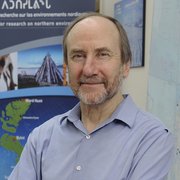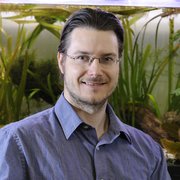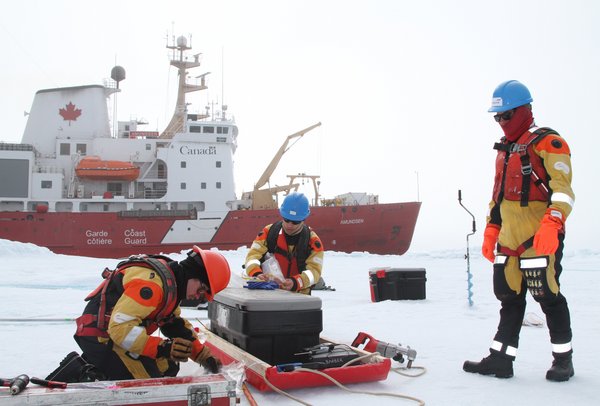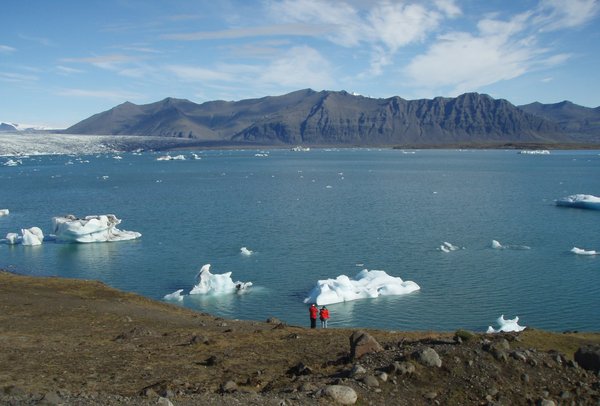Université Laval has substantial expertise in northern research, an area where multidisciplinarity is essential. Many UL chemists and biologists, whether they specialize in oceanography, ecological process modelling, or aquatic ecosystems, are pooling their expertise to better understand the changes caused by global warming in northern Canada and Québec. Together they are finding ways to rehabilitate disturbed land and help Inuit populations adapt to these new conditions.
Explore research on northern ecosystems
The faces of northern ecosystem research
Biogeochemical cycles
Oceans play a key role in the planet’s biogeochemical cycles and in climate regulation. They are the reason the earth is inhabitable. Oceans help regulate the climate through heat transfer and by exchanging climate-active gases with the atmosphere. Research has enabled scientists to understand the global CO2 cycle and the role oceans play in it, but the roles of other gases involved in climate regulation, including dimethyl sulfide and nitrous oxide, are not as clear.

Raoul-Marie Couture, professeur titulaire, Department of Chemistry
Sentinel North Research Chair in Aquatic Environmental Geochemistry
Raoul-Marie Couture specializes in environmental and aquatic geochemistry, water quality modelling, and coupled biogeochemical cycles in lakes and lake sediments. Through his chair, he is studying what happens to carbon released from northern lakes as permafrost melts and is also developing new modelling tools that will improve our understanding of the factors that influence water quality in northern environments.
Impacts of climate change on land and aquatic environments
Climate change affects all living organisms in a given environment, but their responses vary from one ecosystem to another. Climate change can affect biodiversity by desynchronizing trophic levels, the rank of each living being in a food chain. These phenomena are even more pronounced in the North due to the small number of species and the presence of populations that migrate long distances. This pattern has been studied in herbivores, ungulates, and aquatic species using long-term population monitoring.

Warwick Vincent, professeur titulaire, Department of Biology
Canada Research Chair in Aquatic Ecosystem Studies
Warwick Vincent specializes in northern lake ecosystems and aquatic and microbial ecology. He studies the responses of aquatic ecosystems to environmental changes in order to measure their implications for the conservation, monitoring, and management of aquatic resources. Microbial communities are a major focus in his research because their responses to environmental changes could spread across ecosystems.
Ecological process modelling
Modelling uses simplified representations (i.e., models) as substitutes for complex systems in order to facilitate comprehension and study. Digital modelling integrates conceptual models (schemas), mathematical models (equation systems), and computer models (programs/software) to study changes in a given system and make predictions. For example, it is possible to couple the biological and chemical features of an aquatic environment with its hydrodynamic and thermal features to study the effect of variables such as light, temperature, and nutrients on plankton and fish dynamics. Digital modelling must be calibrated and validated through observation in the field.

Frédéric Maps, professeur titulaire, Department of Biology
Active member of the Takuvik Joint Laboratory Program, ArcticNet, and Québec-Océan
Frédéric Maps specializes in modelling food chains in Arctic marine ecosystems and ecosystems in the Estuary and Gulf of St. Lawrence. As part of the Sentinel North program, he models the spread of contaminants and beneficial molecules from microalgae in zooplankton and seafood harvested by the local population. He also uses digital models to study the impacts of climate change on the biodiversity and functioning of planktonic systems, the prey of large marine mammals, and species harvested in the ocean.
The exciting part of graduate studies is being at the frontier of known science and realizing that it’s your turn to make the discoveries!
Myriam Labbé, PhD student in microbiology supervised by Alexander Culley, and winner of the My Northern Project competition
Graduate studies
Make the leap to graduate studies
Explore our fields of study
Oceanography
Oceanography is a one of the earth sciences and uses biology, chemistry, geology, and physics to study various aspects of oceans and seas. Oceanographers conduct research on plate tectonics, major biogeochemical cycles, ocean currents, marine ecosystems, and links between oceans and climate change.
Paleoecology
Paleoecology is the study of the relationship between fossilized living beings and their environments using physicochemical and biological analyses. The aquatic paleoecology laboratory at the Centre for Northern Studies analyzes fossils preserved in sedimentary deposits in northern lakes, ponds, and peatlands to trace climate and environmental changes that occurred eons ago during the Pleistocene and Holocene eras. Dendroecology, which involves analyzing the widths of tree rings, transforms trees into environmental archives, making it possible to date certain disturbances.
Structure and function of continental northern environments
This Centre for Northern Studies research priority brings together scientists who investigate the glacial and post-glacial history of northern systems to understand how they currently function. They study biodiversity, species interactions, and the consequences of disturbances on the structure and composition of northern environments.

Stéphane Boudreau, professeur titulaire, Department of Biology
Member of Centre for Northern Studies (CEN)
Stéphane Boudreau is working on the ecological processes responsible for maintaining biodiversity. Among his research interests, he studies changes in the composition and structure of plant communities in northern Québec in response to rising temperatures using satellite images and fieldwork. He is also investigating the rehabilitation of vegetation in sub-Arctic territories in Nunavik.
When you arrive in an unfamiliar environment like the Arctic where you’ve never lived before, you have no choice but to rely entirely on the scientific method because you can’t use your experience or intuition.
Marcel Babin, professor, Department of Biology and Canada Excellence Research Chair in Remote Sensing of Canada’s New Arctic Frontier

